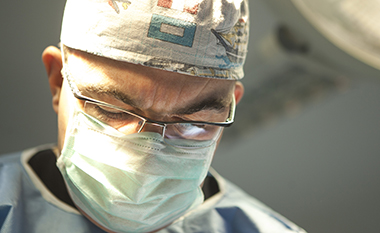
Surgical Period
How do you prepare for surgery?
After the patient’s surgical plan is created, their other diseases and the medications they use are examined. The patient’s radiological examinations and laboratory results, which are required for surgery, are evaluated. If there are additional diseases that may be relevant to the surgery, the relevant branches are consulted. The patient is evaluated for surgery by the anesthesiologist. The surgical strategy is decided based on all the results. The expected benefits and possible risks from the surgical operation are discussed. Medications that the patient should stop taking (such as blood thinners,…) or medications to be continued (such as insulin,…) are determined and arranged.
Day of Hospital Admission and Surgery
The patient usually arrives at the hospital on the morning of the operation or on the day before. No food or drinks should be consumed after midnight before the operation.
Previous radiological examinations and medical records should be brought to the hospital along with an ID. The patient should bring with them the medications they use on a regular basis. Apart from these, simply bringing pajamas, underwear, slippers and personal hygiene materials (such as toothbrush, comb) will be sufficient.
Is it necessary to have a companion with me while I stay in the hospital?
As the nursing care is extremely professional in the hospitals we work with, a companion is not required. However, it is good to have someone stay with you on the first night, to keep you company. Bringing a companion will be free of charge.
Can I have surgery during my menstrual period?
Menstrual period does not interfere with surgery.
For how long will I stay in the hospital?
The length of hospital stay depends on the type of surgery. You should consult your physician about this.
How should I pay attention to my diet during my recovery period?
For a good post-operative wound healing, you need to have a protein-rich diet. You should create a diet that is rich in variety while making sure you are not gaining weight. Care should be taken to consume natural and fresh food. It is important to drink plenty of water and eat fiber-rich foods.
In how many days after the operation can I take a bath?
During the first days after the operation, the surgery site should not get wet. However, bathing could be possible if protection is ensured by covering the wound.
Smoking
It is known that smoking has a particularly bad effect on wound healing. Patients who are smokers should stop smoking for at least two weeks before the surgery and not start again until the wound is fully healed after the surgery. Of course, it is best to take advantage of the occasion and get rid of this bad habit altogether.
What do the procedures and the check-up examinations involve after being discharged?
After being discharged, the patients usually rest at home for two weeks. It is necessary to do the exercises or moves prescribed to you by your doctor and to take your medications without exception. In general, sutures are removed during the second week after the surgery, and the first check-up is performed after the first month. From then on, check-ups are performed in intervals of 3 months, 6 months and 12 months. Check-up dates may be subject to change depending on the condition of the disease.
When will my stitches be removed?
Sutures on the site of the surgery are usually removed in the hospital 2 weeks after the day of surgery. If the sutures do not require removal, you will be informed before being discharged.
When can I get back to my work life?
The timeline to start working depends on the type of surgery. You should consult your physician about this.
Post-operative sexual intercourse?
A healthy sex life is one of the basic conditions of being a healthy individual. Sexual dysfunction significantly affects quality of life and interpersonal relationships in both men and women. Many patients suffering from this problem do not seek treatment because of the feeling of embarrassment or because they think it is not a real medical problem. However, this condition must always be reported to the physician.
Sexual activity after brain surgery may vary greatly according to the type of surgery and pathology. It is known that sexual activity is generally better after spinal operations. However, there is no consensus regarding which position is safer. Although it is thought that the mechanical load applied on the spine during sexual activity can generally be tolerated in 4-6 weeks after surgery, the safest indicator for starting post-operative sexual activity is the reduction of post-operative pain.
You can directly consult your physician about this subject.
Traveling and flying after surgery
The timeline to start traveling and flying depends on the type of surgery. Our team will provide you with assistance in this subject.
Will I need post-operative exercise programs?
The need for post-operative exercise is related to the type of surgery. Although exercise is usually required after surgery, you should consult your physician about this subject.
If I need further treatments after surgery, how will we arrange them?
The need for further treatment after surgery is related to the type of surgery and the pathology of the disease. The need for additional treatment may be determined before the surgery or may become evident after getting some results after the surgery. Our team will make the necessary arrangements by contacting you.
How can I reach the team if I experience any problems?
Our team continues to provide services throughout the treatment process on the basis of the principle of lifetime support and 24/7 availability in case of emergencies.
